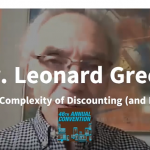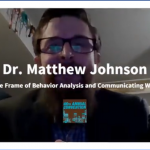With the ever-changing situation surrounding the Covid-19 pandemic, ABAI will be holding their 46th annual conference virtually this week from May 21st – 25th. Despite this different landscape, I am looking forward to participating in and viewing an array of talks, while reconnecting with the research and ideas I value but haven’t focused on as of late. Hoping to re-energize a bit! In considering my schedule of events, I wanted to try to summarize and post about some of the talks relevant to those interested in addiction research, theory, and application.
Over the past four years, I have co-chaired the behavioral pharmacology and neuroscience area programming for the ABAI conference. Annually I’ve contemplated inviting Wolfram Schultz – a highly esteemed neuroscientist who pioneered early work illuminating dopamine’s role in learning about consequences, but I hesitated, thinking he might not be willing to make the trek from overseas. Back in July I finally mustered the gall to inquire with him, and without delay he enthusiastically accepted our invitation to be this year’s B.F. Skinner Lecturer for our area.
Dr. Schultz’s work has been highly impactful. Among other prestigious awards, he was awarded the Zulch Prize of the Max Planck Society in 2013; the Brain Prize of the Grete Lundbeck European Brain Research Foundation in 2017, and in 2018 he won the most valuable prize for brain research by the Gruber Foundation. He will be presenting live on Saturday at 5pm (all times I mention are EST); his talk will focus on how different reward systems in the brain influence and are changed by our choice behavior and experienced consequences. Not one to miss!
I’m also very much looking forward to Dr. August Holtyn’s talk on Monday at 5pm. Dr. Holtyn received her PhD under Michael Perone and completed a postdoctoral position with Kenneth Silverman. She joined the faculty at Johns Hopkins University School of Medicine and is currently developing and evaluating contingency management interventions for the treatment of substance use disorders. Her work has also addressed the intersection of substance abuse disorders with people who live in poverty. Her talk will focus on this very issue – how contingency management programs can be effective not ONLY for addiction outcomes but can also promote behaviors that may facilitate a transition out of poverty – particularly through the use of employment-based abstinence interventions.

The ABAI opening event at 8am on Saturday includes highlighting this year’s winners of the Society for the Advancement of Behavior Analysis (SABA) awards. Several of this year’s awardees have been highly influential in advancing our understanding of addiction. This year, Dr. Leonard Green won the SABA Award for Scientific Translation: On the Complexity of Discounting (and People). His talk will focus on how steep discounting should not be viewed as a “character flaw” – a view that I have embraced in this blog. He’ll delve into some of the complexities surrounding our choice behavior that go beyond our discounting slope and include the consideration of probabilistic consequences, gains as well as losses, and qualitatively different consequences. A preview from Len Green is posted on ABAI’s Facebook page.
 Another SABA awardee is Dr. Matthew Johnson, who has received the SABA Award for Effective Presentation in the Mass Media: Expanding the Frame of Behavior Analysis and Communicating with the Media. Dr. Johnson has been an active science communicator on psychoactive drugs and addiction. As described by Dr. Johnson, “my research has provided me the opportunity to speak to the media about a larger number of topics such as: the therapeutic potential of psychedelic drugs; novel psychoactive drugs largely unknown to the public; the risks associated with alcohol, tobacco, cannabis, and other drugs; the effects of drugs on sex and sexual risk, and the changing landscape of tobacco/nicotine and cannabis products. My behavior analytic background has not only been instrumental in conducting my research, but also in responsibly communicating about these topics to the public.” His talk will also be part of the opening ABAI event, running between 8-10 on Saturday.
Another SABA awardee is Dr. Matthew Johnson, who has received the SABA Award for Effective Presentation in the Mass Media: Expanding the Frame of Behavior Analysis and Communicating with the Media. Dr. Johnson has been an active science communicator on psychoactive drugs and addiction. As described by Dr. Johnson, “my research has provided me the opportunity to speak to the media about a larger number of topics such as: the therapeutic potential of psychedelic drugs; novel psychoactive drugs largely unknown to the public; the risks associated with alcohol, tobacco, cannabis, and other drugs; the effects of drugs on sex and sexual risk, and the changing landscape of tobacco/nicotine and cannabis products. My behavior analytic background has not only been instrumental in conducting my research, but also in responsibly communicating about these topics to the public.” His talk will also be part of the opening ABAI event, running between 8-10 on Saturday.
I’m also looking forward to a symposium related to how behavioral economic concepts can be applied to substance use disorders – 11-12:50 on Monday. Presenters include Justin Strickland, Matthew Johnson (both at Johns Hopkins University School of Medicine), Mickail Koffarnus (University of Kentucky College of Medicine), Matthew Dwyer and Bethany Raiff (Rowan University), with Discussant Greg Madden (Utah State University). So – essentially, some of the most important researchers who work at the intersection of behavioral economics and addiction.
If you’re looking for a workshop: Friday from 8-11 Dr. Richard Cook is hosting one (#34) entitled, “An Applied Behavioral Medicine Approach to Addiction Recovery and Reanimation: Techniques from Public Health and Behavior Analysis Emphasizing Antecedent State as well as Consequence Management”.
From 1-3pm on Saturday is the Behavioral Pharmacology and Neuroscience area’s poster session. Here are some notable entries related to addiction research:
Poster Session #66
9: Uncertainty as a Factor Contributing to Drug vs. Non-Drug Choice. Kandace Farmer, James K. Rowlett, Kevin B. Freeman, SALLY L. HUSKINSON (University of Mississippi Medical Center)
11: Using Environmental Place Conditioning With Planaria to Compare Ethanol With the Novel Psychoactive Compound. MEAI. BRADY J. PHELPS, May Dang, Jennifer Palmer, Malloree Siver, Elizabeth Stromquist, Linda Muckey, Shafiqur Rahman (South Dakota State University)
13: RY-023 but Not D-Cycloserine Facilitates the Elimination of Alcohol-Maintained Behavior and Prevents Its Resurgence in Rats. JEMMA E. COOK, Daniela Rüedi-Bettschen, Donna Platt (University of Mississippi Medical Center)
14: A Nonhuman Primate Model of Resurgence of Alcohol-Maintained Behavior and the Effects of Naltrexone. JEMMA E. COOK, John Overton, Donna Platt (University of Mississippi Medical Center)
15: Effects of Acute and Chronic Nicotine Administration on Choice of Probabilistic Outcomes. KATYA NOLDER, Karen G. Anderson (West Virginia University)
Additionally, Sunday and Monday’s Experimental Analysis of Behavior poster sessions contain presentations that might be of particular interest to addiction specialists (also between 1-3pm):
Poster Session #219
4: Slot Machine Gambling at the Venue versus Laboratory Setting. ALEKSANDRA TEREKHOVA, Mack S. Costello, Avisha Patel, Quintin Robin (Rider University).
8: Does Immediate-Reward Training Increase Impulsive Choice? A Test with Naïve Male and Female Rats. Audrey DeBritz, Carla Martinez-Perez, Hannah Mungenast, ADAM E. FOX (St. Lawrence University).
Poster Session #385
12: Spontaneously Hypertensive and Lewis Rats Learn to Choose Impulsively. MALANA JEAN MALONSON, Carlos F. Aparicio Naranjo Naranjo (Salem State University).
13: Stimulus Control of “Resistance to Temptation” in Pigeons. KARLA CAMPOS, Brenda Estela Ortega, Raul Avila (National Autonomous University of Mexico).
17: Obesity in Adolescents and Devaluation of Outcomes Due to Their Cost: Delay, Probability, and Effort. GISEL G. ESCOBAR, Silvia Morales Chaine (National Autonomous University of Mexico), Suzanne H. Mitchell (Oregon Health & Science University).
One great perk of this virtual format is that anyone who is unable to view presentations during their scheduled times, they will be available online until June 1! This can allow for a more leisurely conference attendance and the opportunity to view talks you otherwise might not choose to attend. Or (ahem), allow you to attend to your children during the day and binge watch with a choice beverage in hand once they’re in bed. Options are helpful during these unprecedented times!
Here’s ABAI incoming President Elect Carol Pilgrim welcoming everyone to this year’s convention, and some information for how to register for the conference if you haven’t already. Stay well, and I hope you enjoy this year’s event from the comfort your home!
